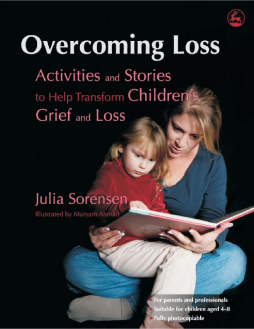
Additional Information
Book Details
Abstract
Overcoming Loss is a photocopiable resource that addresses childrens' feeling of loss, which can arise from changing communities, schools, moving house, divorce or the death of a parent or grandparent. Children are limited to a vocabulary of broad emotions like 'happy', 'sad' and 'angry', and are often unable to articulate their grief in words. This can impair their long-term emotional development.
The activities in Overcoming Loss use the power of play and creative arts to give the grieving child the language to identify subtle feelings, such as shame, despair and jealousy. Designed to encourage social and emotional learning, these exercises employ play, art and story-telling to access the ways in which children naturally express their feelings, and offers opportunities for parents and professionals to direct the child towards understanding their emotions.
Parents, teachers, counsellors and anyone working with children between the ages of 4 and 8 who are dealing with a loss will find this resource a practical and effective tool.
Julia Sorensen is currently studying towards a Doctorate in Psychology, having attained a Master's Degree in Psychology with specialty training in Cognitive Behavioural Therapy. She is a registered professional counsellor and certified therapist and works as a Cognitive Behavioural Therapist in private practice as well as with community based organizations, individuals and families. Julia lives in Canada and may be reached at www.thecbtcoach.com.
This book will prove to be an excellent resource for anyone who is helping children with grief through loss.
Survivors of Bereavement by Suicide (SOBS)
Table of Contents
| Section Title | Page | Action | Price |
|---|---|---|---|
| Tables, boxes, and figures | |||
| Acknowledgements | |||
| Preface | |||
| 1. An Islamic prism of poverty | |||
| 2. The Islamic social sector (zakat and waqf) and development: principles, status, and prospects | |||
| 3. The importance of spiritual capital within human development in Islamic teaching | |||
| 4. Translating faith into development: how do Islamic teachings advocate helping the poor? | |||
| 5. Islamic perspectives on refugees, asylum, and forced migration | |||
| 6. Gender and Islam | |||
| 7. Deconstructing Islamic perspectives on sexual and gender-based violence towards a faith-inclusive approach | |||
| 8. Child protection and safeguarding in an Islamic context: understanding the critical role faith plays in supporting protective mechanisms in humanitarian action | |||
| 9. An Islamic approach to peacebuilding: putting theory into practice | |||
| 10. Walking gently on the Earth: Islamic environmentalism and Muslim FBOs | |||
| Index |
